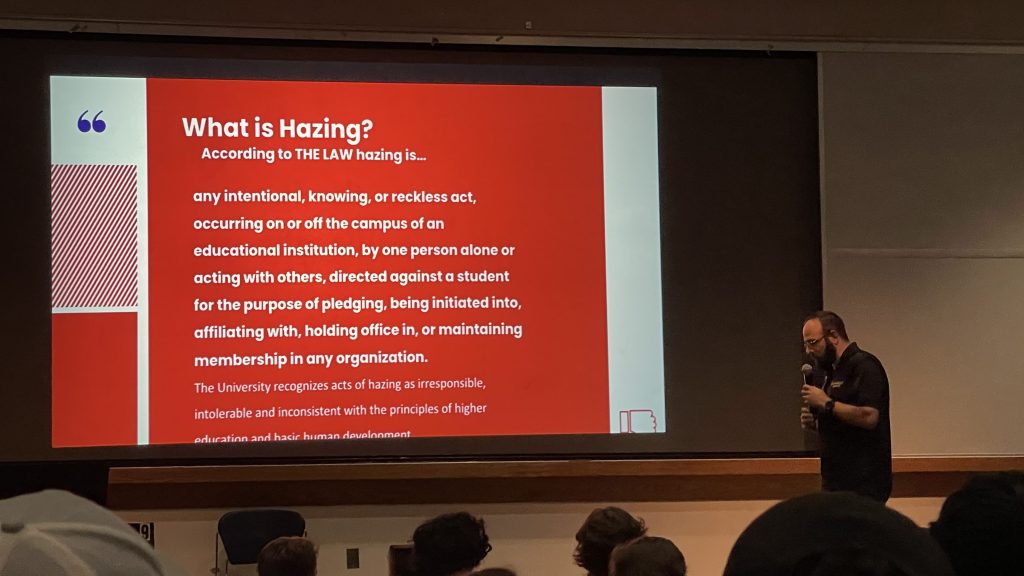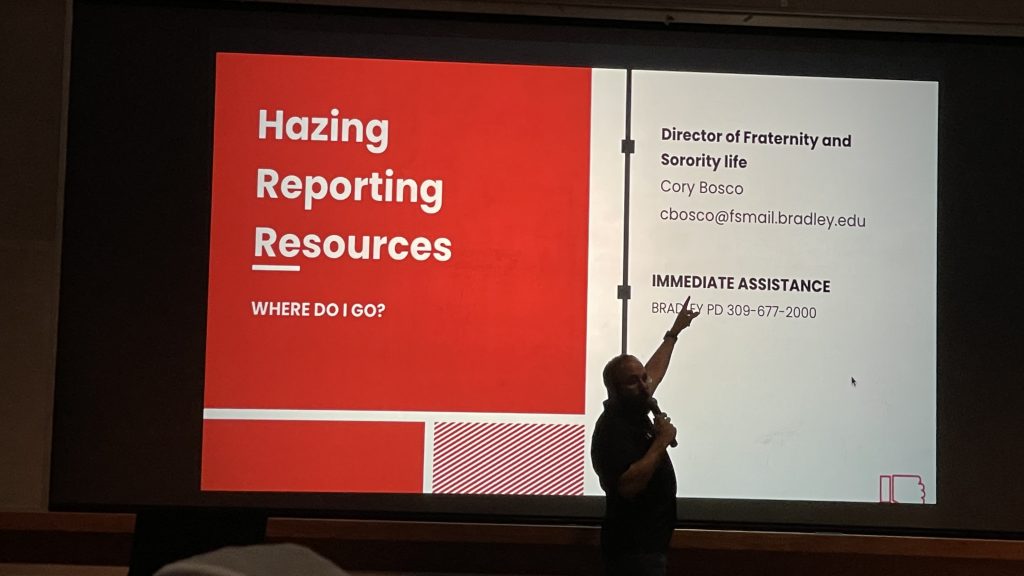
As this past week marked National Hazing Prevention Week for many American college campuses, Bradley’s Panhellenic Council organized a series of events for hazing awareness. A notable activity was a “film and education night” event that took place Sept. 21 in Neumiller Hall.
The event consisted of a presentation by Cory Bosco, director of fraternity and sorority life, to a crowd of students from different Greek-letter organizations on campus. Additional activities organized by the Panhellenic Council invited students to pledge against hazing in exchange for a free treat and to take a stand by wearing either purple or their organization letters.
In the presentation, Bosco gave background on hazing alongside information on what Bradley students can do to help prevent it.
Two hazing-centered clips from the hidden-camera series “What Would You Do?” were worked into the presentation. Both clips featured members of a Greek organization subjecting recruits to public hazing such as dumping ice-cold water on them, forcing them to chug alcohol and throwing powder at them. The first clip showed fraternity hazing, while the second had sorority hazing.
While some bystanders confronted the members or alerted nearby authorities, many simply recorded the events from afar on their phones. Others even assisted in the hazing by offering tips or photographing/filming the events, prompting shocked reactions from the students.
After showing the clips, Bosco highlighted differences between them, such as the sorority members using body-shaming and slut-shaming language, as indicative of wider differences between male and female hazing.
“For men, it’s typically more physical [and] more aggressive,” Bosco said. “For women, hazing tends to take on a more emotional and psychological harm, and so it’s those terms of…insulting attire, insulting friends.”
Bosco also focused on the idea of hazing consisting of a wide range of actions between “little H” and “capital H” offenses.
“Hazing is a spectrum of behaviors because a lot of times, those insults … feel [like] ‘No, it’s just friends being stupid,’” Bosco said. “So it starts down here [as a ‘little H’ offense], and very quickly it moves down here [as a ‘capital H’ offense].”
The Illinois law definition of hazing given in the presentation is described as “any intentional, knowing or reckless act” on or off-campus against a student in order for them to gain or maintain organization membership. This can include violence, physical exhaustion and activities that could inflict mental stress or humiliation.
Bradley’s definition was largely the same, differing in emphasizing the hazing victims as students seeking to join groups and being coerced into harmful acts that no student should ever partake in.
“The University recognizes acts of hazing as irresponsible, intolerable and inconsistent with the principles of higher education and basic human development,” a slide of the presentation read.
Bosco’s detailing of hazing included a graph that showcased the general rise in American hazing deaths. He also noted some of the reasoning behind hazing, which included upholding tradition, peer pressure and gaining popularity.
As an alternative to hazing’s toxic dynamics, Bosco advised students to instead promote belonging, unity and scholarship through special outings, fun games and required study hours.

In situations that could potentially be hazing, he further advised students to ask themselves questions like whether their parents or an administrator would approve of their actions and whether their participation would violate their values or cause distress to themselves or others.
“If your answer to these is concerning at all, more than likely, it at least violates some campus policy but probably falls into the hazing category,” Bosco said.
Bosco also listed a variety of signs that students could pick up on to identify possible after-effects of hazing, including mood swings, drastic shifts in sleep habits and extreme changes in appearance. He pointed to his email (cbosco@fsmail.bradley.edu), Bradley police (309-677-2000) and an anonymous national hazing tipline (1-888-NOT-HAZE) as places where students with concerns can go.
The event closed with a reminder of the 125th anniversary of Bradley’s Greek life coming next year, which Bosco presented as an opportunity for students in the community to hold themselves to the best standards.
“Everywhere across the country, fraternity-sorority life is referred to as that shining house upon the hill,” Bosco said. “As fraternities and sororities here at Bradley University, we are that house on the shining hill above the hilltop that Bradley is on. … We should act that way. We should live our values. … 125 years of fraternity/sorority excellence here at Bradley; let’s not let that end because of one stupid decision, one failed chance to comment and one failed chance to react to these smaller hazing or drinking issues.”




